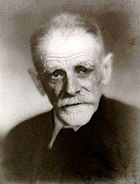fiction.wikisort.org - Writer
Kostis Palamas (Greek: Κωστής Παλαμάς; 13 January [O.S. 8 January] 1859 – 27 February 1943[1]) was a Greek poet who wrote the words to the Olympic Hymn. He was a central figure of the Greek literary generation of the 1880s and one of the cofounders of the so-called New Athenian School (or Palamian School, or Second Athenian School) along with Georgios Drosinis and Ioannis Polemis.
Kostis Palamas | |
|---|---|
 | |
| Born | 13 January 1859 Patras, Greece |
| Died | 27 February 1943 (aged 84) Athens, Greece |
| Occupation | Poet |
| Nationality | Greek |
| Alma mater | University of Athens (no degree) |
| Signature | |
 | |
Biography
Born in Patras, in the same house as born the Italian novelist Matilde Serao,[2] he received his primary and secondary education in Mesolonghi. In 1877 he enrolled at the School of Law, Economics and Political Sciences of the University of Athens, but he soon abandoned his studies.[3] In the 1880s, he worked as a journalist. He published his first collection of verses, Songs of My Fatherland, in 1886.
He was nominated for the Nobel Prize for Literature on 14 occasions, but never received it.[4]
He held an administrative post at the University of Athens between 1897 and 1926, and died during the German occupation of Greece in World War II. His funeral was a major event of the Greek resistance: the funerary poem composed and recited by fellow poet Angelos Sikelianos roused the mourners and culminated in a demonstration of 100,000 people against Nazi occupation.
Work
Palamas wrote the lyrics to the Olympic Hymn, composed by Spyridon Samaras. It was first performed at the 1896 Summer Olympics, the first modern Olympic Games. The Hymn was then shelved as each host city from then until the 1960 Winter Olympics commissioned an original piece for its celebration of the Games, but the version by Samaras and Palamas was declared the official Olympic Anthem in 1958 and has been performed at each celebration of the Games since the 1960 Winter Olympics.
Honors
The old administration building of the University of Athens, in central Athens, where his office was located, is now dedicated to him as the "Kostis Palamas Building" and houses the "Greek Theater Museum", as well as many temporary exhibitions.



Palamas has been informally called the "national" poet of Greece. He was an influential voice in Greek literature for more than 30 years, and greatly influenced the entire political-intellectual climate of his time. Romain Rolland considered him the greatest poet in Europe.
Works
Collections of poems
- Songs of my Fatherland (1886)
- Hymn to Athena (1889)
- Eyes of my Soul (1892)
- Iambs and Anapaests (1897)
- The Grave (1898)
- The Greetings of the Sun-born (1900)
- Ή Ασάλευτη Ζωή (The Motionless Life)(1904)
- Twelve Lays of the Gypsy (1907)
- The King's flute (1910)
- Yearnings of the Lagoon (1912)
- Satirical Exercises (1912)
- The State and Solitude (1912)
- Altars (1915)
- Extempora (1919)
- The 14 verses (1919)
- The 5 verses - The passionate secret whispers - The Wolves - Two flowers from afar (1925)
- Cowardly and Harsh verses (1928)
- The 3 Verse Cycle (1929)
- Passages and Greetings (1931)
- The Nights of Phemius (1935)
- Evening Fire (1944, posthumous edition by his son, Leander Palamas)
Prose
- Death of a Youth (novel, 1901)
- Novels (1920)
Theater
- The Thrice-noble (drama, 1903)
Criticism
Palamas was one of the most respected literary critics of his day, and instrumental in the reappraisal of the works of Andreas Kalvos, Dionysios Solomos and the "Ionian School" of poetry, Kostas Krystallis et al.
Translations
- The King's Flute, tr. T. P. Stephanides, G. C. Katsimbalis (1982) [Greek and English texts]
- The King's Flute, tr. F. Will (1967)
- The Twelve Lays of the Gypsy, tr. G. Thomson (1969)
- The Twelve Words of the Gypsy, tr. T. P. Stephanides, G. C. Katsimbalis (1974; repr. 1975)
- A Hundred Voices, tr. T. P. Stephanides, G. C. Katsimbalis (1976)
- Ruins, Grief, On The Trip You Are Taken, Rose Fragrance, tr. A. Moskios[5]
References
- Kostís Palamás -- Britannica Online Encyclopedia at www.britannica.com
- "Το πατρικό σπίτι του Κωστή Παλαμά που βρίσκεται στην Πάτρα (Κορίνθου 241) βγήκε στο "σφυρί." | Σκάϊ 89.4 Πάτρας - Skai Patras". skaipatras.gr. Archived from the original on 18 July 2014. Retrieved 22 February 2022.
- "Palamas, Kostis, 1859-1943" at E.KE.BI / Biblionet
- "The Nobel Prize in Literature: Nominations and reports 1901–1950". www.nobelprize.org. Retrieved 16 January 2020.
- "Poetry of Kostis Palamas". moskios.com.
External links
 Media related to Kostis Palamas at Wikimedia Commons
Media related to Kostis Palamas at Wikimedia Commons- Works by Kostes Palamas at Project Gutenberg
- Works by Kostis Palamas at LibriVox (public domain audiobooks)

- Works by or about Kostis Palamas at Internet Archive
На других языках
- [en] Kostis Palamas
[es] Kostís Palamás
Kostís Palamás (en griego: Κωστής Παλαμάς; Patras, 13 de enero de 1859-27 de febrero de 1943) fue un poeta y dramaturgo griego, autor de la letra del himno Olímpico.[fr] Kostís Palamás
Kostís Palamás (en grec : Κωστής Παλαμάς), né à Patras en 1859 et mort à Athènes en 1943, était un poète grec de tout premier plan, considéré comme le plus important de sa génération. Il fut d'ailleurs proposé pour le Prix Nobel de littérature en 1939.[ru] Паламас, Костис
Кости́с Палама́с (греч. Κωστής Παλαμάς; 13 января 1859, Патры — 27 февраля 1943, Афины) — греческий поэт, беллетрист и критик. Основатель Новой Афинской школы. В творчестве Паламаса нашли выражение гуманистические и революционно-демократические идеалы конца XIX — начала XX веков.Другой контент может иметь иную лицензию. Перед использованием материалов сайта WikiSort.org внимательно изучите правила лицензирования конкретных элементов наполнения сайта.
WikiSort.org - проект по пересортировке и дополнению контента Википедии